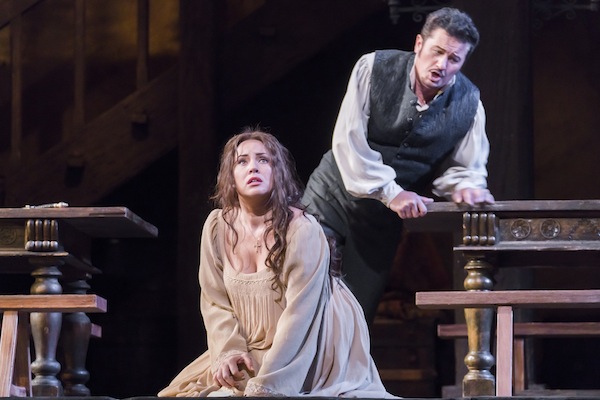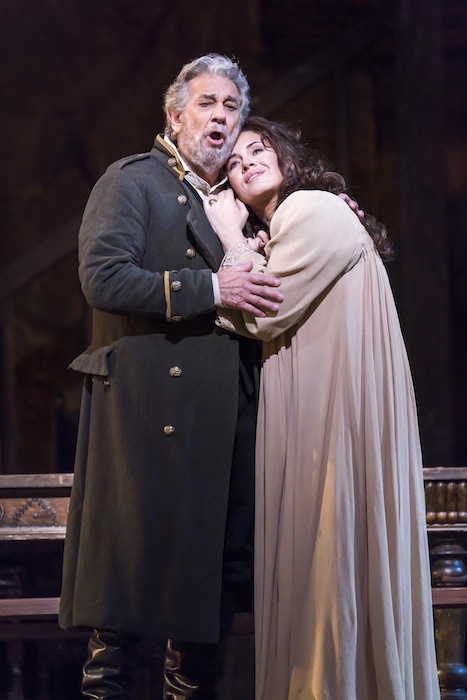Domingo provides a steady flame in the Met’s late-sparking “Luisa Miller”

Sonya Yoncheva and Piotr Beczała in Verdi’s “Luisa Miller” at the Metropolitan Opera. Photo: Chris Lee
Monday’s performance of Verdi’s Luisa Miller at the Metropolitan Opera began unpromisingly, with the lead singers sounding somewhat off in a disappointingly conventional score.
Three hours later, the opera was in high gear, barreling toward its catastrophic conclusion.
The difference between ho-hum and oh-my-God was due in part to the cast, who stopped fumbling for notes and forcing their tone and started realizing Verdi’s intentions in a big way. And also to Verdi himself, who seemed to transform between acts from a purveyor of set pieces and cabalettas into a music dramatist ready to rival Wagner.
It’s customary to classify Luisa Miller as a transitional work between Verdi’s early, Rossini-influenced operas and the great repertoire staples from his “middle period.” What the analysts don’t usually point out is that the process happens audibly within the work itself. By Act III, the old stop-the-action-for-the-aria model has yielded to a far more organic growth of music from action and vice versa, as the opera barrels toward its catastrophic conclusion.
Whether for that reason or some other, the singers found their vocal footing as the performance unfolded. Verdi had put the title role in the catbird seat, revising (reluctantly) another soprano role out of the libretto and leaving Luisa surrounded with dark-voiced singers—a mezzo soprano, baritone and two basses in the other main roles.
In the early going Sonya Yoncheva didn’t exploit that advantage very well. The staccato and embellishments of her first avowal of love (“Lo vidi, e’l primo palpito”) sounded labored, and her high notes tended to spread and squawk. By the third act, however, Yoncheva’s singing had improved greatly on both those fronts, and she was giving full-throated expression to her character’s tragic circumstances.

Sonya Yoncheva and Plácido Domingo in “Luisa Miller.” Photo: Chris Lee
And speaking of full-throated, in the other role of the opera’s potent father-daughter combination was a singer old enough to be Yoncheva’s grandfather. Although uncertainty surrounds Plácido Domingo’s age—he admits to 77—there was nothing uncertain about his vocalism, or his forceful stage presence, in the role of Miller. Having dominated the tenor repertoire for decades, Domingo seemed bent on putting baritones out of work as well.
Now relying mainly on oral resonance, Domingo’s voice wasn’t the biggest in the room–conductor Bertrand de Billy restrained the orchestra a bit when he was singing–but for force of personality and his affecting portrayal of a proud old veteran and doting dad, the superannuated superstar was the class of the night.
At first, tenor Piotr Beczała brought some vocal uncertainty and pinched high notes to the role of Rodolfo, son of the usurping Count Walter and Luisa’s true love. That ship got righted too, and his Act II aria “Quando le sere al placido” was every bit the show-stopper Verdi must have known it would be.
In his twisted way, Count Walter is as concerned for his son’s well-being as Miller is for Luisa’s—well-being defined as “marrying up” to the rich widow Duchess Federica instead of his girl in the village. In the early scenes Monday, Alexander Vinogradov seemed to be pushing his roomy bass voice, but when he backed off a little vocally he was able to round out the villainous Count with some Macbeth-like fear and remorse at having murdered his way to the top.
A cooler brand of villainy was practiced by the Count’s retainer Wurm—yes, the name means what it sounds like in German—who, in bass Dmitry Belosselskiy’s clear-voiced portrayal, was chillingly implacable in his pursuit of a single goal: Luisa. He offered the girl the choice between renouncing Rodolfo and marrying him, or her father’s death in prison, as if it were a simple business proposition.
Although Verdi and librettist Salvadore Cammarano seemed to have included Federica mainly to advance the plot, mezzo-soprano Olesya Petrova brought sympathy to the sketchy role, reminding Rodolfo of their childhood friendship in warm, creamy tones.
The small cast was rounded out by the strong, pleasing voices of soprano Rihab Chaieb as Laura, a girl from the village who befriends Luisa, and tenor Patrick Miller as a peasant assisting Rodolfo.
Like most of the cast (except the reliable Domingo), the orchestra under conductor de Billy performed less than its best in Act I, but the rippling clarinets sounded divine under Rodolfo’s great Act II aria, and the flutes and piccolo so essential to the Verdi sound twittered or soothed effectively all evening. The orchestra also gave a good account of the opera’s striking overture, almost Schubertian in its shapely theme and smart development.
Visually, Elijah Moshinsky’s production was a mélange, apparently keeping the medieval Tyrolean sets from earlier productions while updating the costumes to the 1840s (Verdi’s own period) and changing the location to England (whose peerage includes dukes and earls, but no counts). Perhaps set and costume designer Santo Loquasto could have come up with something besides baronial attire for Rodolfo to wear while wooing Luisa incognito in the village. No wonder daddy sensed something was up.
Luisa Miller will be repeated 7:30 p.m. Friday and Monday, 12:30 p.m. April 14, 7:30 p.m. April 18, and 12 p.m. April 21. Luca Salsi will appear as Miller on April 18. metopera.org; 212-362-2000.



Posted Apr 15, 2018 at 11:06 am by C. Lapierre
Wonderful performance of P. Domingo(April 14) dramatically and vocally.
And very appreciated performance of Alexander Vinogradov and his voice.
I did find the setting to dark and mourning.
Why transplanting the action in England? Absolutely not necessary………….